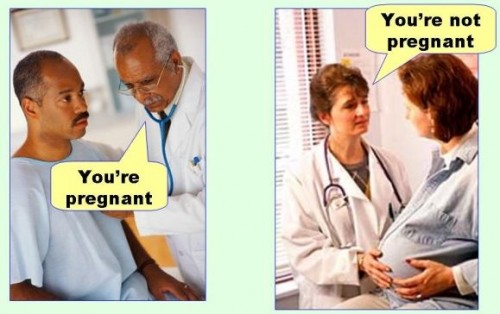At Sociological Images, we make research methods fun!
Not really.
But here we go!
Scholars testing a research hypothesis have to be worried about two kinds of errors. Type I is failing to reject a false hypothesis. The hypothesis is wrong, but it looks right to you. That’s a false positive.
Type II is rejecting a true hypothesis incorrectly. In fact, your hypothesis is correct, but your data suggests that it’s false. That’s a false negative.
Test time!
Which one is which?
You’re welcome everybody!
Here’s as far back as I could trace the source. If anyone knows where this came from, please let me know. :)
Lisa Wade, PhD is an Associate Professor at Tulane University. She is the author of American Hookup, a book about college sexual culture; a textbook about gender; and a forthcoming introductory text: Terrible Magnificent Sociology. You can follow her on Twitter and Instagram.

Comments 13
cronbach — June 22, 2014
I know what this is meant to be but um as a man who does have a uterus (yeah, I'm trans, still have my original reproductive organs)... I find this a lot less fun and funny than I'm supposed to.
Larry Charles Wilson — June 22, 2014
It would have gone over better, Lisa, if you were a professional comedian. ;)
gasstationwithoutpumps — June 22, 2014
I've always found the nomenclature "Type I" and "Type II" rather poorly designed. There is no inherent ordering of the two types of errors, so which is "I" and which is "II" is rather arbitrary. Using "false positive" and "false negative" is much clearer and less arbitrary, as the names can be picked apart to reveal their meaning. Let's eliminate "Type I" and "Type II" from our jargon!
Agnostic Zetetic — June 22, 2014
Why doesn't someone with a PhD, who has written a book on gender, find it as unsettling as I do that plenty of men (like me) are at a higher risk of medical malpractice because of the gender-biased assumptions doctors make about what biological parts they do/don't have? I can't begin to tell you how many times I've been in a medical office and heard "Well, we don't have to worry about a urine sample for pregnancy since you're a man," and then I have to cut them off and say "What's that got to do with anything?"
I'm really tired of people assuming they know what can and can't be wrong with my body -- and consequently failing to provide appropriate medical treatment for no reason other than their uneducated, privileged assumptions.
Hugh G Rection — June 23, 2014
Lots of bitching and moaning about what's not in the photos rather than what is.
Abpraxis — November 21, 2018
Hi Lisa. The images are actually not in line with what you wrote.
For the type I, you wrote "The hypothesis is wrong, but it looks right to you." I don't see that the doctor on the left is thinking "this guy *looks* pregnant" or the data *looks* right.
On the type II, you write, "your hypothesis is correct ...," but I don't see where the doctor on the right is *hypothesizing* that she is not pregnant (which would have to be the case for the doctor to make that claim).
It's a memorable example of the errors, but the word bubbles perhaps could read, for type I, "Sir, the data says you are pregnant. We'll have to go with that." And for type II perhaps, "At first I thought you were pregnant ... but the data says otherwise, so we'll go with that."
Aiden Cartwright — August 12, 2022
Genuinely had a common experience examining their articles and these all are unreasonably close to perfection and they have a fantastic impulse. Furthermore, I think this https://keepcalms.com/p/keep-calm-and-design-buildings/ site can assist you with working on the nature of your work. For sure, even this article rouses me towards my business, and this association worth being at the top since they have staggering inspiration.